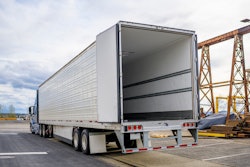The 2025 heavy truck order season (September through December 2024) saw a 6% year-over-year increase in cumulative net orders, according to FTR Transportation Intelligence, reflecting positive momentum into the new year.
For the full year 2024, total Class 8 net orders rose 11% year-over-year, slightly above replacement demand levels, with a monthly net average of 23,323. Total Class 8 orders for 2024 reached 279,872 units.
Preliminary North American Class 8 net orders in December totaled 31,900 units, down 7% month-over-month, but a significant 23% increase year-over-year, according to FTR. Slightly exceeding seasonal expectations, last month's total surpassed the seven-year December average of 29,716 orders.
 ACT Research
ACT Research
ACT Research reported that Class 8 net orders were 36,500 units last month, down 2.1% month-over-month, but up 39% year-over-year.
Although OEMs saw a month-over-month decline in December order activity, most outperformed seasonal expectations as net orders remained relatively strong for what is typically a slower month, said Dan Moyer, senior analyst, commercial vehicles at FTR.
Additionally, there was no significant difference in month-over-month trends between the vocational and on-highway segments, Moyer said.
Class 8 order activity remains robust as the industry looks ahead to 2025, said Kenny Vieth, ACT’s president and senior analyst. While December orders saw a modest 2.1% decline from November, it was nearly 39% higher than last December’s performance.
“With the largest seasonal factor of the year, seasonal adjustment is always unkind in December,” said Vieth. “On a seasonally adjusted basis, Class 8 orders fell 15% from November to 29,700 units and a 356k SAAR.”
[RELATED: Cost reduction is a top priority for shippers and carriers in 2025, report says]
Moyer added that his firm is watching ongoing discussions and developments related to President-elect Trump’s plans to impose immediate tariffs on imports from Mexico, Canada, and China as more than 40% of Class 8 trucks sold in the U.S. are built in Mexico.
“Tariffs could significantly disrupt supply chains and raise production costs, compounding disruptions already anticipated due to EPA 2027 NOx regulations,” Moyer said. “Fleets may adjust order and retail demand strategies in response.”











